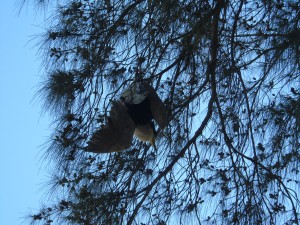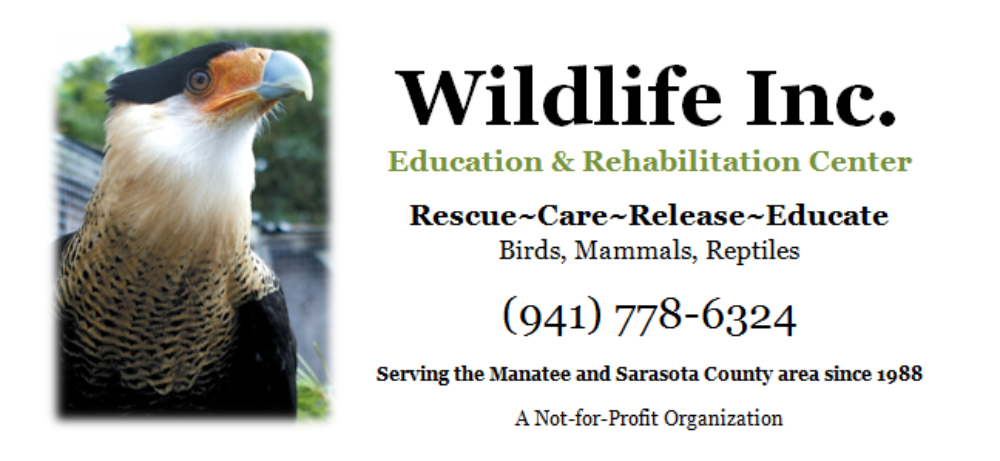
Since the cause of the vast majority of injury to the animals who end up in rehab centers is human interaction, there are many things we can do to prevent inadvertent injury in the first place.
Here are some handy hints:
- Keep your house pets in the house. Cats and dogs are not part of the natural food chain, and their predation upsets the balance of nature. Since they are not truly “hunting,” they generally injure the animals they attack, often cruelly, painfully, and fatally.
- Many of us in Florida have reflective windows. Territorial birds attack them, seeing their own reflection, or dive at the reflected sky. While determined cardinals are often undeterred by most remedies, much of this interaction can be minimized through the use of hanging plants, streamers, bird silhouettes or inflatable owls, or pinwheels. Some people put fake snakes on windowsills.
- When walking the beach, remove plastic six-pack connectors, monofilament fishing line, kite strings, fishhooks, and watch batteries (gulls will swallow anything). All these can cause terrible injuries to shore birds. (Remove kite strings from trees, too. They can entangle and even decapitate birds.)
- Wild animals have no instinct that includes cars. Vehicle/animal collisions are form a large portion of animals that come to rehab centers. Watch the shoulders of roads as you drive to see if there are animals preparing to cross the highway. Anticipate that they may dart in front of your vehicle. Be particularly wary in wooded areas, state parks, and wildlife refuges. If you can, stop and remove turtles from roadways or road shoulders.
- Place caps over chimneys and vents to prevent birds, squirrels, and raccoons from entering. Stuff cracks and holes with steel wool. Keep foundations, roofs, and walls in good repair and windows screened. Once critters take up residence, they are hard to dislodge, and you may be surprised to find they are protected and that exterminators will not help you to eradicate them.
- Feed pets inside; or if you must feed outdoors, remove dishes and police the feeding area for left over food. Keep garbage in sealed cans that keep odors locked in. Keep foodstuffs and garbage indoors if possible. If you compost, put left over table scraps at least 6-12 feet deep so their odors don’t attract unwanted wildlife.
- Case your yard before you mow! Look for signs of nesting rabbits, burrowing owls and other ground nesting birds. Baby animals grow up fast, and missing a week or two of mowing will cause no harm to your lawn and may save the lives of those nesting in it.
- If clearing trees, check for active nests before you cut them down. If they pose no safety hazard, consider leaving dead trees standing. They are “apartment houses” to birds, flying squirrels, and many other species of wildlife. And clear no more trees than you absolutely must, because every tree cut represents both a loss of habitat and food source.
- Don’t leave motor oil in pans around your property. Birds try to bathe in it, or fall in, and few survive.
- Don’t try to raise or treat wildlife yourself. No matter how “cute,” they make terrible pets, have specialized dietary and housing needs, and either fail to develop survival skills, and or lose their fear of humans, which dooms them when released to the wild. Leave such tasks to licensed rehab centers. You may also want to consider that it is illegal to harbor and treat wild animals without federal and state licensing.
- Use non- or low toxic products on your lawn and shrubs. Work with your service provider or association board to ensure that wildlife-friendly products are used.
- Never, and we mean never feed wildlife. Left over bread and other table foods are not nutritious, and often contain additives that are lethal to wildlife. Animals are foragers and take the path of least resistance. If you feed, they will be dependent on your generosity, and may even become aggressive about demanding food. There is no real reason to feed birds in feeders, either, as our climate provides abundant diet. Spilled feed attracts pests to your lawn, and birds of prey to your yard.
- If you take an animal to a rehab center, consider taking a donation of food or money as well, or offer to volunteer your time. Your thoughtfulness will be greatly appreciated.
